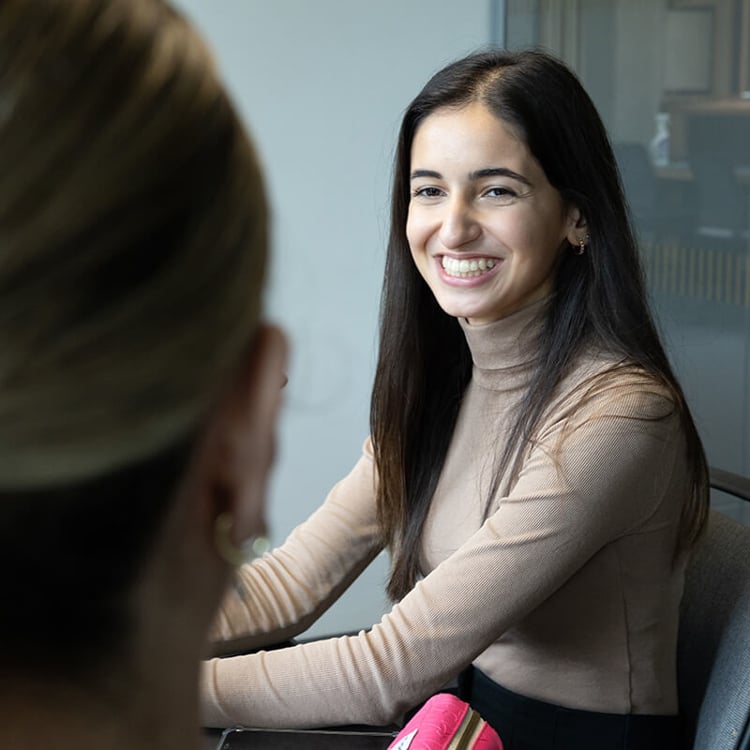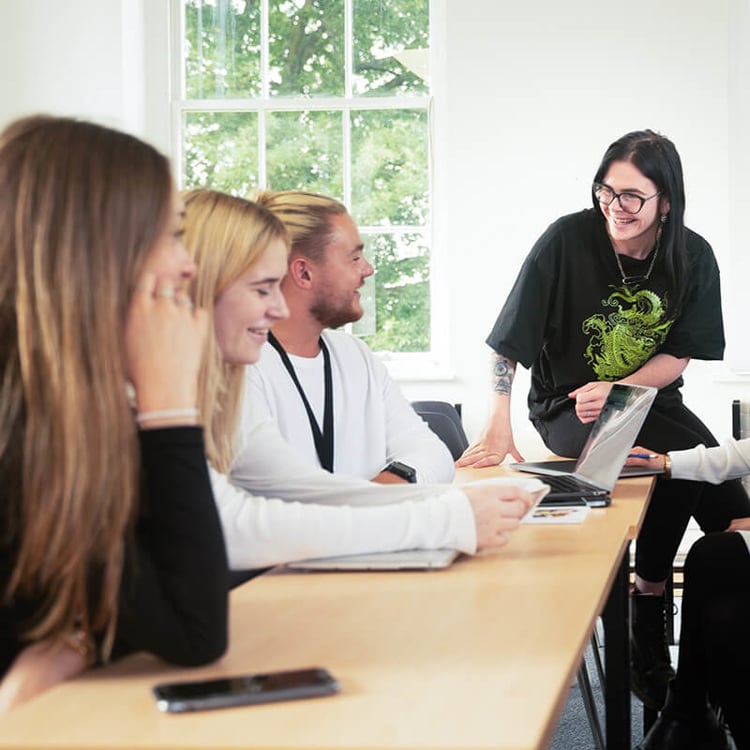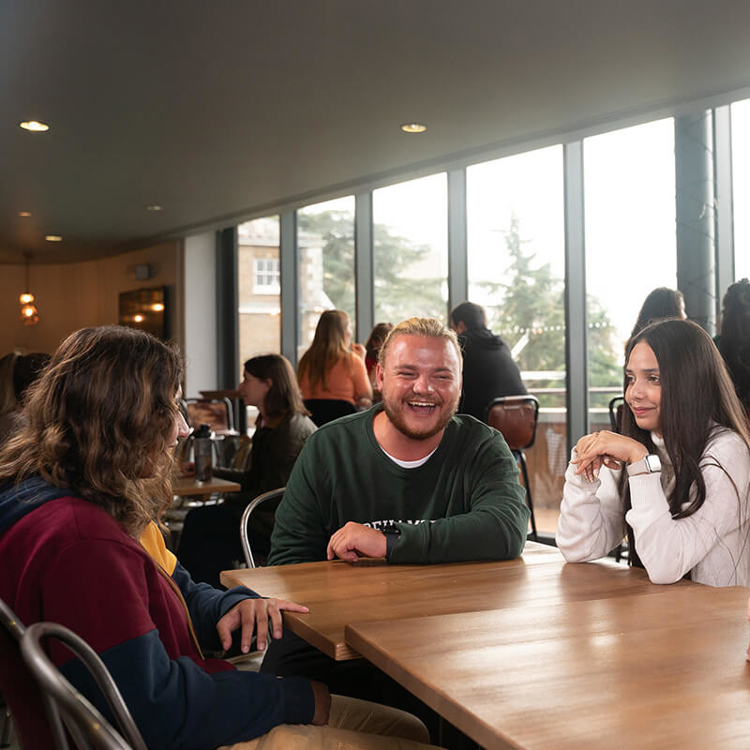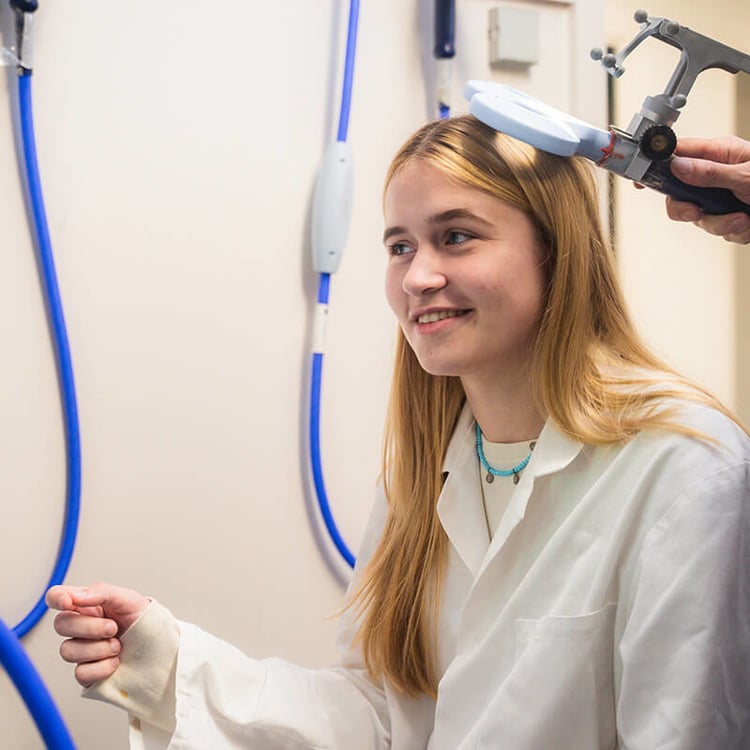Duration:
2 years (full-time)
3 years (part-time)
Number of credits:
180
Start date(s):
September 2025
September 2026
Become a qualified music therapist and learn to use music to improve wellbeing and to positively support people of all ages through diverse challenges.
Did you know?
Approved by the Health Care Professions Council (HCPC), this training leads to a nationally recognised professional qualification as a music therapist.
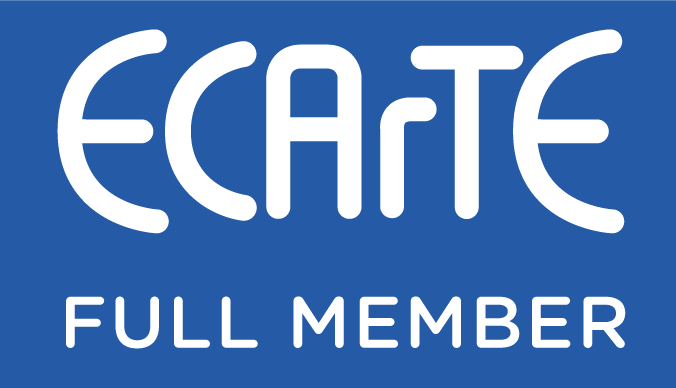

Modules
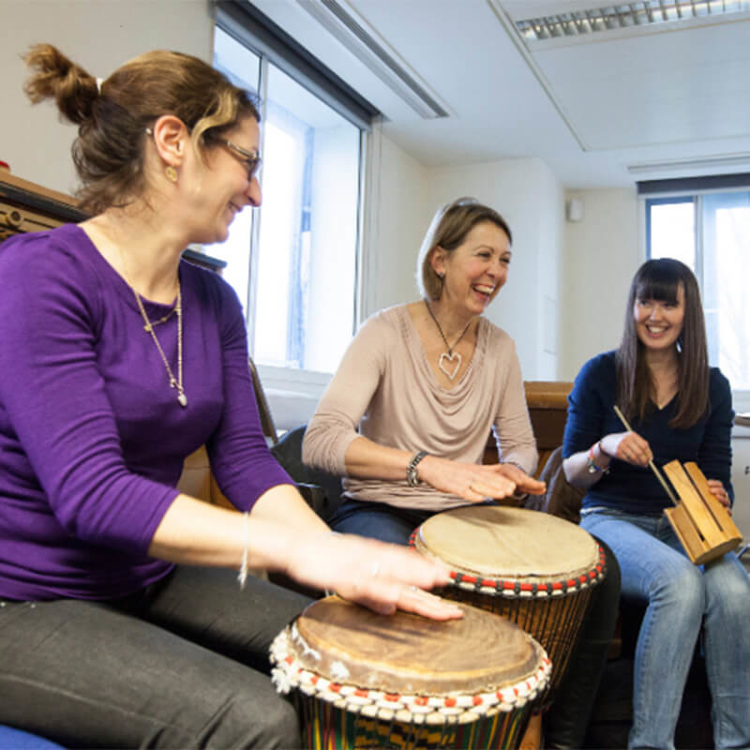
Skills
Music therapists draw on the inherent qualities of music to support people of all ages and at all stages of life who face diverse challenges.
Music therapy facilitates positive changes in wellbeing through engagement in musical interaction.
Music therapists work with both musical and verbal material within a therapeutic relationship, engaging a wide range of service users in accessible therapeutic work, to promote greater wellbeing through specific therapeutic aims. The programme enables those who are competent and practising musicians to train as therapists, combining their skills, education, and life experiences to support a diverse range of service users.
Music therapy not only provides direct therapeutic support to service users but also supports and enhances the work of the wider team around the individual. Therefore, students and qualified music therapists work with families and interdisciplinary colleagues, and may lead and deliver training and specific therapeutic initiatives. They also contribute to assessment, formulation, and the broader work of the multi-disciplinary team, which will vary according to the setting.
Your curriculum
The MA in Music Therapy trains students to gain the qualification that confers eligibility for registration with the Health and Care Professions Council (HCPC). All elements of the curriculum, as well as the learning and teaching methods, enable students to demonstrate their ability to meet the HCPC Standards of Proficiency required for registration.
Within the programme, central historical psychoanalytic concepts are examined through the lens of contemporary practice, constructing a flexible and up-to-date framework for music therapy practice. Improvisation, songwriting, the use of technology, and pre-composed music are all explored as part of the development of students' musical skills. A key principle of questioning power and equality is embedded throughout the training, influencing the teaching of theory, clinical skills, and placement work. The programme equips students with a contemporary framework for music therapy practice, as well as the skills to gain employment and work effectively across all health and care settings. Alongside profession-specific learning, there is an emphasis on interprofessional practice (with two modules taught across the Arts and Play Therapies programmes), leadership, and innovation.
The training pathway follows a logical sequence, allowing students to develop the skills and abilities needed to integrate theory and practice, acquire and demonstrate clinical skills both at university and during placements, show leadership and innovation, and graduate with strong employability prospects.
Students will engage in lecture seminars, discussion groups, reflective practice groups, experiential learning, music skills-based and problem-based learning, as well as work-based learning (placement). Experiential learning is central to the training, particularly in developing clinical (musical) and reflective therapeutic skills. All students undertake two placements (two days a week for the 180-credit programme and one day a week for the 240-credit programme), supervised by Placement Educators at the placement setting, and supported at university through Reflective Practice Groups and lecture seminars, which provide additional learning opportunities.
As part of their development as reflective practitioners, all students on the 180-credit programme are required to undergo personal therapy for two years of their training (usually years 2 and 3 for part-time students). Independent learning tasks further support student learning, involving a mix of studio time, small peer group work, and individual independent study.
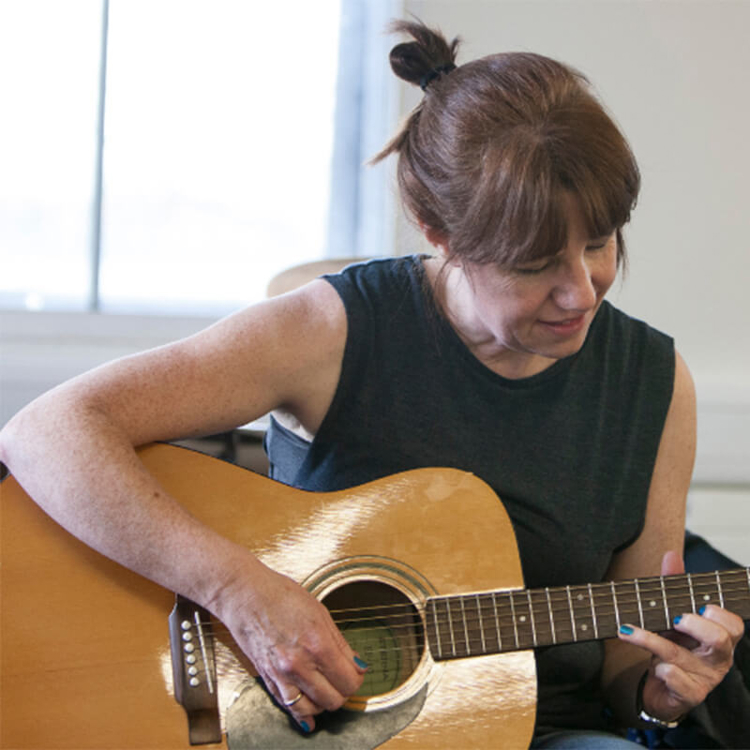
Music therapists work in a wide range of clinical settings, both in individual and group work. They work with people of all ages, from infants and young children to elderly adults. Music therapy can benefit individuals with a variety of experiences and challenges, including mental health problems, learning disabilities, autism, dementia, neurodisability, and those receiving hospice care. It is also used to support individuals with serious illnesses or those who have experienced trauma. Placements involve working with children, young people, and adults in the settings where music therapists commonly practise.
Key areas of study include human development and growth in the context of music therapy, music therapy theory, the development of therapeutic skills (with a focus on music therapy improvisation, but also encompassing other approaches such as songwriting and music technology), observational studies, placement work, reflective practice, and an introduction to research. Some core teaching takes place with peers from across the Arts and Play Therapies programmes, offering unique opportunities for interdisciplinary learning. Personal development and reflection are central throughout the programme.
Music Links and Personal Statement - Instructions and Guidelines
Please follow these instructions carefully, as failure to do so may result in your application not being considered.
Music links/CD
You must provide the following music recordings at the point of application:
- Two contrasting pieces on your preferred instrument.
- One piano/keyboard piece (if this is not your preferred instrument).*
- One improvisation, which may be titled if you wish.**
The total playing time should not exceed 15 minutes, so extracts from longer pieces are acceptable. Please name your electronic files using your name, the date, and details of each piece (including title and composer).
Do not submit music where you are part of a group unless you are clearly identifiable as the soloist (e.g., vocalist or instrumental soloist accompanied by piano or a small ensemble). Please provide details if this is the case. A piece where you are, for example, the drummer or guitarist in a band, is unlikely to provide an adequate representation of your abilities.
Ensure that links do not require passwords or specific software to open them.
*If you do not have piano/keyboard skills, you may submit a piece on another harmonic instrument and make note of this in your application.
** In your free improvisation, you should rely on your personal musicality rather than traditional tonalities and harmonic idioms.
In all your playing, aim to demonstrate expressive qualities, musical imagination, and depth, as well as technical competence. Your music is an initial indication of your skills and does not need to be of professional recording quality. We are looking for applicants who show potential, motivation to engage with and support people through music, and a high level of skill in both ensemble and solo playing.
Personal Statement
Your personal statement should be between 500 and 1,000 words and address the following key areas:
- What has led you to pursue training as a therapist? Demonstrate insight into how your life experiences have influenced this decision.
- Your musical background, including the genres and styles with which you have experience. You may include additional musical resources or versatility not demonstrated in your submitted music, if you wish.
- Your experience working with people, particularly those with whom music therapists generally work (e.g., children, young people, adults or older adults with diverse needs, including learning disabilities, autism, mental health problems, or trauma). Such experience is a mandatory prerequisite for training.
- Your understanding of music therapy as a distinct discipline, particularly as practised in the UK. Mention any relevant courses, conferences, reading, or meetings with music or other therapists, as well as any personal therapy or development. If invited to an interview or audition, you should be prepared to discuss some of your reading.
The personal statement provides an indication of how well you express yourself in writing and helps us identify issues to explore with you during the interview.
Submission Instructions
Your completed application form should be submitted online. If you are unable to attach your music files to your application, please contact the postgraduate admissions department for further advice.
More information
For more information and an information booklet please contact Tessa Watson at Tessa.watson@roehampton.ac.uk.
What percentage of alumni find subsequent employment in music therapy?
Most students who graduated last year have found employment. Some of this work is part time. Several of last year’s students have created their own work – in schools, day centres etc. Some students choose to work part time whilst maintaining other work (such as performing or teaching).
How competitive is it to get onto the course?
We receive approximately 50 applications each year. Preparing thoroughly is important in order to ensure that you have the required skills, abilities and experience (see the application pack).
Are there any scholarships unique to this course, and if so what is success in application based on (ie musical ability or academic prowess)? Are there any other sources of funding you can recommend?
There are no bursaries given by the University. There is a small award (£1,000 for 2 students) given once students are on the course, on the basis of need. There is a bursary given through BAMT (see BAMT.org for this, and also as a good source of information about music therapy). Students do find funding through charities (often local).
Are most students classically trained, and is it an issue if I am not?
The majority of students are classically trained, however, we accept students from other backgrounds and do encourage you not to let a non traditional background dissuade you from applying. As well as a high level of musicianship we also look for an ability to play in different styles/ways, and to use music communicatively and sensitively.
What level should first-instrument musicianship be? Should this be, for instance, grade 8 or post-conservatoire/ professional?
Usually, our students have a music degree or have been to music college. However, some students have come through a non-traditional music route and are able to show through their performance that they have a high level of musical skill.
Is it required that students play a second instrument, and if so what level does proficiency is needed?
Most students have a second instrument but if piano is your first study instrument, it is not required. Most students have keyboard skills, however we are able to consider applications from students who do not have keyboard skills if they demonstrate ability on another harmonic instrument. All applicants should be able to demonstrate confidence with voice. Melody instruments/voice are encouraged as first study instruments.
What level of keyboard skills are required?
Most students play at grade 5 ABRSM or above (this grading is given as a helpful comparison for applicants only). However, if you do not have piano/keyboard skills you may provide a piece on another harmony instrument and note this in your application.
What is the deadline for applications?
The University operates a 'gathered field' approach for admission. Gathered field means grouping applications together for consideration. It is used where the number of places available is restricted to make the admissions process fairer to applicants. You can find the most up-to-date information on deadlines here.
What should I include on my application?
Please read the "Your application" tab on the MA Music Therapy course page, prior to completing your application. Musical requirements, as well as a personal statement, make up a part of your application. Full details can be found on the course page.
When are auditions held?
On Tuesdays and Wednesdays in April, May, June and sometimes July. Occasionally late interviews/auditions are held in August, and early interviews/auditions are held in December. We prefer applications to be submitted around or before Easter.
Could you provide me with some details on the audition?
We ask for 2 pieces on first study, 1 on piano and 1 on voice. Then there is a series of questions relating to different areas of the course, and at the end of the interview, some improvisation. There is also a group audition (with other candidates) that gives further opportunities to use your music. Most applicants enjoy their interviews/auditions. We are committed to helping you perform to your potential and we take a friendly and supportive approach at interview/audition.
We also offer weekend introductory courses, 5 day Summer Schools, and 20 week part time evening Foundation Courses which provide a useful background in related professions. For more information, see our Psychology Short Courses.
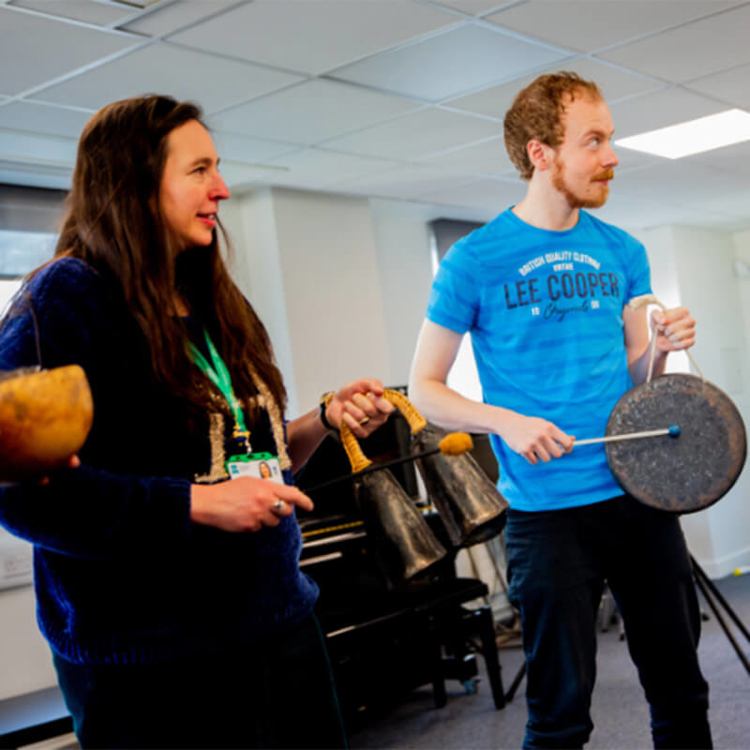
Placements
Clinical work is central to the training, embedded in the curriculum.
After visits to a variety of workplaces which offer music therapy, you will undertake individual and group work in two contrasting settings over six months, January to June (first placement) and September to April or June (second placement). Each placement is 2 days per week.
All students complete 2 placements, supervised by Placement Educators who are Music Therapists in the placement setting, and supported at University by Reflective Practice Groups and lecture/seminars which provide additional learning opportunities.
Integration of theory with practice is a central part of students' learning, leading to an ability to work in professional practice with an ethical framework that includes self care and reflective practice (part of sustainable therapeutic practice).
Career
Recent graduates have gained employment in a variety of settings, including the NHS, mainstream and special education, and charitable organisations. They work with children, adults, and older adults who have learning disabilities and special needs, including autism, mental health challenges (in community, acute, and secure psychiatric settings), or who have experienced trauma. They also work in dementia care, neurodisability, with care-experienced children, and in hospice and hospital care. Graduates work as both employed and self-employed music therapists. To find out more, you can join the British Association for Music Therapy.
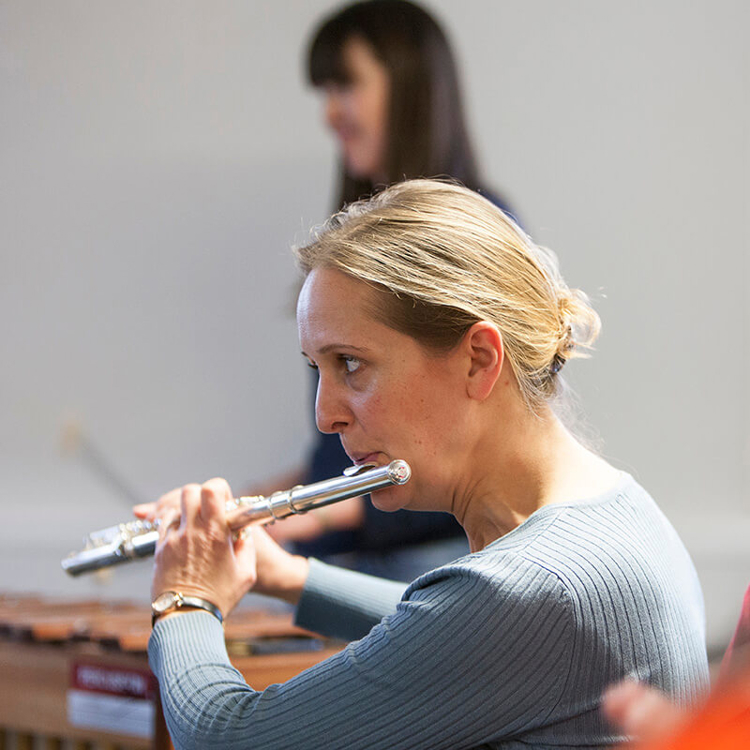
Open days
Get a real taste of our campus, community and what it’s like to study at Roehampton
Applying
UK postgraduate students apply through our direct application system.
This course uses a gathered field approach to process applications. Find out more information on how we will process your application.
Application deadline: 4 July 2025.
Interview date(s): 15 – 22 July 2025.
Specific entry requirements
- Please read the "Your application" tab on this page prior to completing and submitting your application, as it contains important information on what to include.
- Applicants will normally be required to hold an honours degree, usually in music. Other related disciplines such as psychology, teaching, nursing, or social work, and graduate level professional qualifications in appropriate disciplines such as the performing arts, Occupational Therapy and Social Work are also considered where music skills are demonstrably sufficient.
- Applicants need to evidence that they can meet the academic demands of a Masters degree and will be required to prepare and submit a written personal statement to support their application.
- A high level of musicianship on a musical instrument (including voice) and additionally confidence with vocal skills.
- Keyboard/piano skills (where piano is not the preferred instrument) or equivalent ability on another harmony instrument. Keyboard skills will usually be approximately Grade 5 ABRSM (however applicants do not need to have passed this exam).
- The potential to use musical skills in professional Music Therapy practice and the ability to communicate musically.
- It is expected that applicants will have extensive experience either having worked professionally or having practiced extensively within their specific arts modality.
- An understanding of the nature of music therapy as a distinctive discipline (in particular as practised in the UK).
- Applicants should demonstrate a maturity of personality and self-awareness compatible with training as a therapist. Applicants need an appropriate degree of psychological mindfulness including the capacity to form and maintain appropriate empathic relationships with clients. They should also demonstrate emotional literacy, robustness and an ability to be self-reflective. This is addressed through a combination of assessments, including a health screening form, searching questions at interview related to different parts of the training course and experiential work at interview/audition.
- Applicants will be expected to have appropriate clinical experience of having worked within a setting and with clients relevant to the programme. This might include working with children, adults or older adults in the areas of learning disabilities, mental health, hospice care, dementia care, neuro-disability, homelessness etc (this is not an exhaustive list). This work can be undertaken either on a voluntary or employed basis.
- An International English Language Testing System (IELTS) score of at least 7 with no element below 6.5 for applicants for whom English is not their first language.
- Applicants will be required to supply the names of two referees, normally one of these should be able to comment on the applicant’s academic suitability and the other the applicant’s clinical suitability for the programme. References are always taken up prior to offering a place.
- In addition to these requirements, all students must be prepared to enter mandatory individual personal therapy. Payment for therapy is separate to course fees.
- All successful applicants will need to complete an enhanced Disclosure and Barring Service (DBS) check. Payment for this is separate to the course fees. A volunteer check cannot be accepted for this purpose.
- Applicants who have lived in any one non-UK country for 12 months or more will also need to obtain a DBS clearance from that country or countries. This includes whether as a whole year or with visits totalling twelve months or more since they were 18 or in the last 10 years if they are aged over 28.
General entry requirements
September 2025 entry tuition fees (UK)
| Level of study | Full-time* | Part-time* |
| MA | £11,250 | £7,500 |
*Year 1 fee
We offer a wide range of scholarships and bursaries. See our financial support pages for UK students.
We also provide other ways to support the cost of living, including free buses and on-campus car parking, hardship support and some of the most affordable student accommodation and catering in London. Find out more about how we can support you.
Additional costs to consider
Students must attend mandatory weekly personal therapy for two years, funded separately from course fees. Full-time students require therapy throughout training, while part-time students need it for two years. Costs vary, so applicants should research expenses in advance.
Successful applicants must apply and pay for an enhanced Disclosure and Barring Service (DBS) check (even if previously completed). Subscription to the DBS Update Service is strongly recommended to reduce costs.
Personal indemnity insurance is required for placements.
Travel costs for placements should be considered, typically ranging from £200–£300 per placement.
Some placements may require immunisation updates, including paying for vaccinations. Those unwilling to update their status may face limited placement options.
Students may need to purchase books, learning equipment, and recording devices. In some cases, personal video/audio recording equipment and an encrypted memory stick for clinical material storage may be required.
International postgraduate students apply through our direct application system.
This course uses a gathered field approach to process applications. Find out more information on how we will process your application.
Application deadline: 4 July 2025.
Interview date(s): 15 – 22 July 2025.
Specific entry requirements
- Please read the "Your application" tab on this page prior to completing and submitting your application, as it contains important information on what to include.
- Applicants will normally be required to hold an honours degree, usually in music. Other clinically related disciplines such as psychology, teaching, nursing, or social work, and graduate level professional qualifications in appropriate disciplines such as the performing arts, Occupational Therapy and Social Work are also considered where music skills are demonstrably sufficient.
- Applicants need to evidence that they can meet the academic demands of a Masters degree and will be required to prepare and submit a written personal statement to support their application.
- A professional standard of proficiency on an instrument (including voice).
- Keyboard/piano skills of approximately grade 5 (where piano is not the preferred instrument) or equivalent ability on another harmony instrument, and confidence with voice. The potential to use musical skills in professional Music Therapy practice and the ability to communicate musically.
- It is expected that applicants will have extensive experience either having worked professionally or having practiced extensively within their specific arts modality.
- An understanding of the nature of music therapy as a distinctive discipline (in particular as practised in the UK).
- Applicants should demonstrate a maturity of personality and self-awareness compatible with training as a therapist. Applicants need an appropriate degree of psychological mindfulness including the capacity to form and maintain appropriate empathic relationships with clients. They should also demonstrate emotional literacy, robustness and an ability to be self-reflective. This is addressed through a combination of assessments, including a health screening form, searching questions at interview related to different parts of the training course and experiential work at interview/audition.
- Applicants will be expected to have appropriate clinical experience of having worked within a setting and with clients relevant to the programme. This might include working with children, adults or older adults in the areas of learning disabilities, mental health, hospice care, dementia care, neuro-disability, homelessness etc (this is not an exhaustive list). This work can be undertaken either on a voluntary or employed basis.
- An International English Language Testing System (IELTS) score of at least 7 with no element below 6.5 for applicants for whom English is not their first language.
- Applicants will be required to supply the names of two referees, normally one of these should be able to comment on the applicant’s academic suitability and the other the applicant’s clinical suitability for the programme. References are always taken up prior to offering a place.
- In addition to these requirements, all students must be prepared to enter mandatory individual personal therapy. Payment for therapy is separate to course fees.
- All successful applicants will need to complete an enhanced Disclosure and Barring Service (DBS) check. Payment for this is separate to the course fees.
- We also offer 20 week evening foundation courses which provide a broad oultine and introduction in the arts and play therapies.
General entry requirements
September 2025 entry tuition fees (international)
| Level of study | Full-time* | Part-time* |
| MA | £18,250 | £12,170 |
*Year 1 fee
We offer a wide range of scholarships and bursaries. See our financial support pages for international students.
We also provide other ways to support the cost of living, including free buses and on-campus car parking, hardship support and some of the most affordable student accommodation and catering in London. Find out more about how we can support you.
Additional costs to consider
Students must attend mandatory weekly personal therapy for two years, funded separately from course fees. Full-time students require therapy throughout training, while part-time students need it for two years. Costs vary, so applicants should research expenses in advance.
Successful applicants must apply and pay for an enhanced Disclosure and Barring Service (DBS) check (even if previously completed). Subscription to the DBS Update Service is strongly recommended to reduce costs.
Personal indemnity insurance is required for placements.
Travel costs for placements should be considered, typically ranging from £200–£300 per placement.
Some placements may require immunisation updates, including paying for vaccinations. Those unwilling to update their status may face limited placement options.
Students may need to purchase books, learning equipment, and recording devices. In some cases, personal video/audio recording equipment and an encrypted memory stick for clinical material storage may be required.


